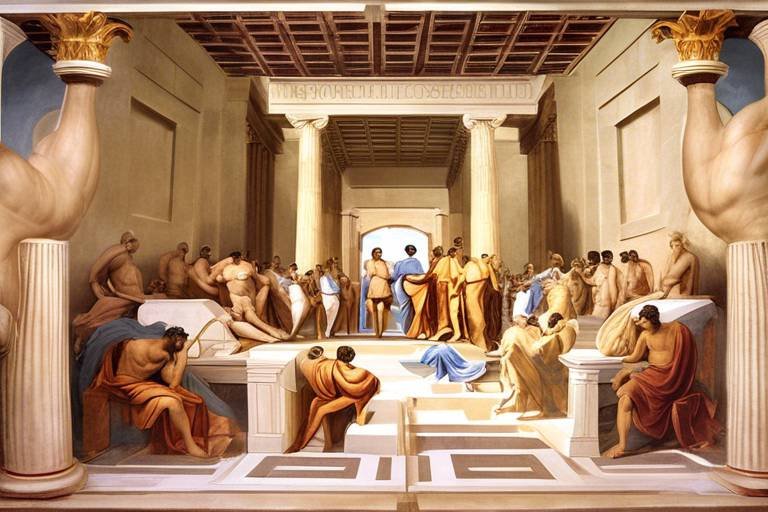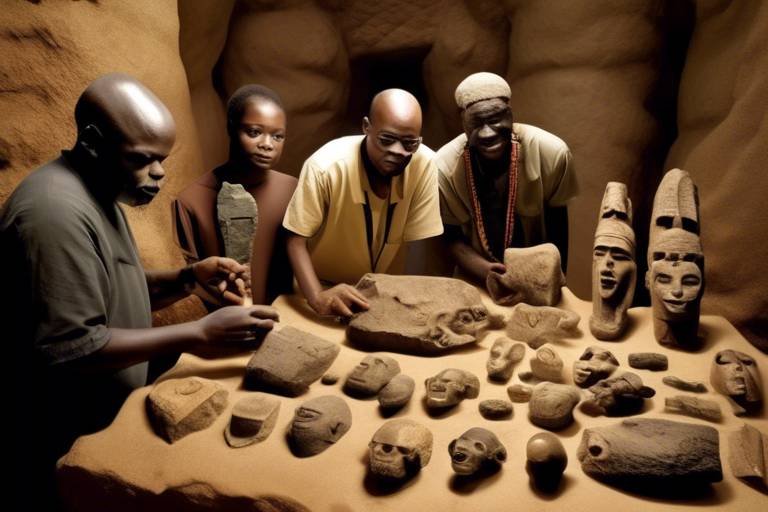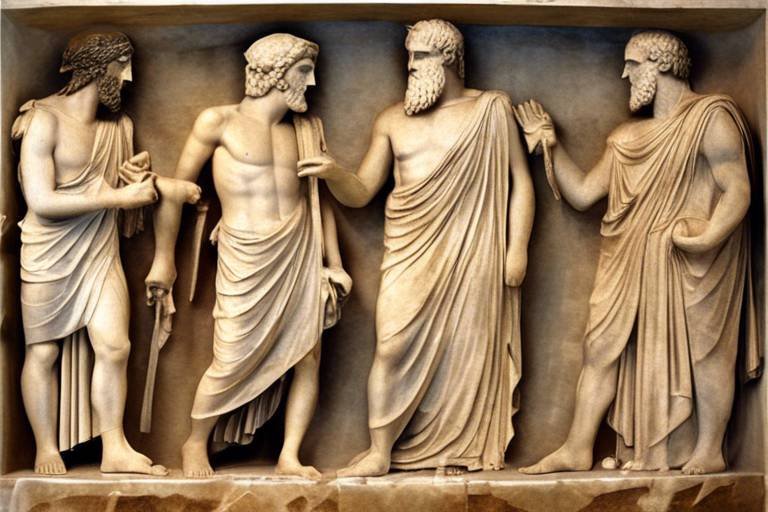The Secrets of the Ancient Greek Philosophers
Embark on a journey through the annals of history to uncover the secrets of the Ancient Greek Philosophers, whose wisdom continues to resonate through the corridors of time. These revered thinkers, with their profound insights and revolutionary ideas, laid the foundation for modern philosophy and intellectual discourse.
Delve into the philosophy of Socrates, the trailblazer of Western philosophical thought, renowned for his Socratic method that emphasized introspection and moral rectitude. His teachings on self-examination and ethical integrity have left an indelible mark on philosophical inquiry.
Explore the vast contributions of Aristotle, a polymath whose influence spans across logic, ethics, and metaphysics. From his treatises on politics to his studies in biology, Aristotle's legacy endures in academia, shaping diverse fields of knowledge with his profound insights.
Unravel the Allegory of the Cave by Plato, a metaphorical journey from ignorance to enlightenment that challenges our perceptions of reality and truth. This allegory serves as a timeless allegory for the quest for knowledge and the liberation of the mind from the shackles of ignorance.
Contrast the philosophies of Epicureanism and Stoicism, two schools of thought that offer distinct perspectives on pleasure, virtue, and the pursuit of happiness. While Epicurus extolled the virtues of simple pleasures, the Stoics advocated for resilience in the face of adversity, providing practical guidance for daily living.
Engage with the enigmatic teachings of Heraclitus, the philosopher of change and unity of opposites, whose insights into the nature of the cosmos continue to intrigue scholars. Heraclitus' reflections on the eternal flux of existence offer profound contemplation on the fundamental principles of reality.
Trace the influence of Pythagoras in mathematics, music, and philosophy, uncovering his mathematical theorems and mystical beliefs in the harmony of the universe. Pythagoras' contributions to geometry and his philosophical musings on the interconnectedness of all things resonate through the ages.
Contemplate Zeno's Paradoxes, thought experiments that challenge conventional notions of motion and infinity, sparking debates among ancient and modern thinkers. These paradoxes continue to provoke contemplation on the nature of reality and the limits of human understanding.
Reflect on the enduring legacy of Ancient Greek philosophy, which continues to shape intellectual thought, ethical principles, and scientific inquiry in contemporary society. The profound wisdom of these ancient philosophers serves as a beacon of enlightenment, guiding us in our quest for knowledge and understanding.
Immerse yourself in the timeless wisdom of the Ancient Greek Philosophers, whose insights transcend the boundaries of time and space, offering profound reflections on the nature of existence and the pursuit of truth.

Philosophy of Socrates
When delving into the profound world of ancient Greek philosophy, one cannot overlook the influential figure of Socrates. Often regarded as the father of Western philosophy, Socrates revolutionized the way we approach knowledge and ethics. His philosophical method, known as the Socratic method, emphasized critical thinking, self-examination, and the pursuit of truth through questioning. Socrates believed that true wisdom comes from acknowledging one's ignorance and constantly seeking to expand one's understanding of the world.
Central to Socrates' teachings was the concept of moral integrity. He believed that living a virtuous life was the key to personal fulfillment and societal harmony. By questioning societal norms and challenging conventional beliefs, Socrates encouraged his followers to think for themselves and cultivate a strong sense of individual morality. His unwavering commitment to truth and integrity ultimately led to his trial and execution, a testament to his steadfast dedication to his philosophical principles.
Socrates' philosophy transcends time and continues to inspire thinkers and scholars to this day. His emphasis on self-examination and moral introspection serves as a timeless reminder of the importance of questioning our beliefs and values. In a world filled with noise and distractions, Socrates' teachings urge us to pause, reflect, and engage in meaningful dialogue with ourselves and others.

Aristotle's Contributions
Aristotle, one of the most influential figures in the history of philosophy, made significant contributions that continue to shape our understanding of the world today. His wide-ranging work encompassed various disciplines, including logic, ethics, metaphysics, politics, and natural sciences. Aristotle's methodical approach and meticulous observations laid the foundation for many fields of study, leaving a lasting impact on intellectual thought.
One of Aristotle's key contributions lies in his development of formal logic, particularly his syllogistic reasoning, which became a cornerstone of Western philosophy and scientific inquiry. His logical system provided a framework for deductive reasoning and argumentation, influencing subsequent philosophers and shaping the way we approach rational thinking.
In the realm of ethics, Aristotle's ethical theory, known as virtue ethics, emphasized the cultivation of moral virtues as the path to a flourishing and fulfilling life. By focusing on character development and the pursuit of excellence, Aristotle's ethical framework continues to offer valuable insights into the nature of human behavior and the essence of a good life.
Moreover, Aristotle's contributions to metaphysics, the study of the fundamental nature of reality, were profound. He delved into questions of substance, causality, and the nature of being, laying the groundwork for metaphysical inquiries that would captivate philosophers for centuries to come.
Notably, Aristotle's influence extended beyond philosophy into fields such as politics and biology. His political theory advocated for the ideal state governed by the principles of justice and the common good, while his biological observations and classifications formed the basis of early scientific inquiry into the natural world.
Overall, Aristotle's enduring legacy can be seen in his comprehensive approach to knowledge and his commitment to systematic inquiry. His contributions continue to inspire and challenge thinkers across disciplines, underscoring the timeless relevance of his philosophical insights.

Plato's Allegory of the Cave
Exploring the profound wisdom and teachings of renowned Greek philosophers from antiquity, shedding light on their philosophies, methods, and enduring impact on modern thought.
Delving into the life and teachings of Socrates, the father of Western philosophy, known for his Socratic method and emphasis on self-examination and moral integrity.
Examining Aristotle's vast contributions to logic, ethics, and metaphysics, highlighting his influence on fields ranging from politics to biology and his enduring legacy in academia.
Plato's Allegory of the Cave is a powerful metaphor that captivates the imagination and challenges our perceptions of reality. In this allegory, Plato describes a group of people who have lived chained inside a cave, facing a wall their entire lives. They see only shadows cast by objects behind them and mistake these shadows for reality. When one of them is freed and sees the outside world, he realizes the true nature of existence and the limitations of human perception. This allegory serves as a profound reflection on the journey from ignorance to enlightenment, urging us to question our beliefs and seek deeper truths beyond the shadows on the cave wall.
Contrasting the philosophies of Epicurus and the Stoics, examining their views on pleasure, virtue, and the nature of happiness, and their practical applications in daily life.
Exploring the enigmatic teachings of Heraclitus on change, unity of opposites, and the nature of the cosmos, revealing his profound insights into the fundamental principles of existence.
Tracing the influence of Pythagoras in mathematics, music, and philosophy, uncovering his contributions to geometry, the Pythagorean theorem, and his mystical beliefs in the harmony of the universe.
Analyzing Zeno's paradoxes that challenge our understanding of motion and infinity, examining their implications for philosophy and mathematics, and the debates they sparked among ancient and modern thinkers.
Reflecting on the enduring legacy of ancient Greek philosophy in shaping intellectual thought, ethical principles, and scientific inquiry, and its continued relevance in contemporary society.

Epicureanism and Stoicism
Epicureanism and Stoicism represent two distinct philosophical schools that emerged in ancient Greece, each offering unique perspectives on life, happiness, and virtue. Epicureanism, founded by the philosopher Epicurus, emphasizes the pursuit of pleasure as the highest good, but not in a hedonistic sense. Rather, Epicureans seek to achieve a state of tranquility and freedom from fear by satisfying basic needs and avoiding unnecessary desires. They value simple pleasures, friendship, and mental peace over material wealth or social status.
On the other hand, Stoicism, founded by Zeno of Citium, advocates for the cultivation of inner strength, resilience, and virtue in the face of adversity. Stoics believe in living in harmony with nature, accepting the things they cannot change, and focusing on what is within their control. They prioritize moral integrity, wisdom, and self-discipline, viewing external circumstances as indifferent to one's inner peace and happiness.
While Epicureanism and Stoicism differ in their fundamental principles, both philosophies offer practical guidance on how to lead a fulfilling and meaningful life. Epicureans seek to minimize pain and maximize pleasure through moderation and simplicity, while Stoics aim to cultivate inner peace and virtue through self-awareness and acceptance of the natural order of the universe.
Ultimately, whether one aligns more with the teachings of Epicurus or the Stoics, both philosophical schools provide valuable insights into the nature of happiness, the pursuit of virtue, and the importance of living in accordance with one's values and beliefs.

The Philosophy of Heraclitus
Heraclitus, known as the "Obscure Philosopher," delved deep into the nature of change and the unity of opposites. His philosophy centered around the concept that everything is in a constant state of flux, famously stating that "you cannot step into the same river twice." This enigmatic thinker believed that change was the fundamental essence of the universe, and that opposites are interconnected and necessary for harmony.
According to Heraclitus, the world is governed by a divine logos, or universal reason, which orchestrates the ever-changing nature of reality. He viewed fire as the primary element symbolizing transformation and the source of all things. Heraclitus's teachings emphasized the interconnectedness of all things and the cyclical nature of existence, where opposites are in a perpetual state of tension and balance.
His philosophical insights have had a profound impact on subsequent thinkers, influencing the development of metaphysics, epistemology, and ethics. Heraclitus's emphasis on change and unity of opposites laid the groundwork for understanding the dynamic nature of the universe and the interconnectedness of all phenomena.

The Influence of Pythagoras
Pythagoras, a legendary figure in the realm of ancient Greek philosophy, left an indelible mark on various disciplines, including mathematics, music, and metaphysics. His profound influence extended beyond his renowned Pythagorean theorem, which revolutionized geometry, to encompass mystical beliefs in the harmony of the universe. Pythagoras' teachings emphasized the interconnectedness of numbers and the universe, portraying mathematical relationships as fundamental to understanding the cosmos. His philosophical insights transcended mere arithmetic, delving into the spiritual and metaphysical realms, where he posited the existence of a universal order governed by numerical principles.
Moreover, Pythagoras' philosophical school, known as the Pythagoreans, not only advanced mathematical knowledge but also delved into ethical teachings and the study of music. The Pythagoreans believed in the significance of moral conduct, the pursuit of wisdom, and the cultivation of harmony in both the soul and society. Their holistic approach to education encompassed intellectual, moral, and spiritual development, reflecting Pythagoras' belief in the interconnectedness of all aspects of life. This holistic perspective influenced subsequent philosophical traditions and underscored the importance of integrating intellectual inquiry with ethical reflection.
The legacy of Pythagoras reverberates through history, inspiring generations of thinkers to explore the hidden symmetries and harmonies underlying the fabric of reality. His mathematical discoveries not only laid the foundation for geometric principles but also paved the way for advancements in fields such as astronomy and physics. The Pythagorean theorem, a cornerstone of mathematics, remains a testament to Pythagoras' intellectual prowess and enduring impact on scientific thought. Beyond mathematics, Pythagoras' emphasis on the unity of the cosmos and the inherent order of the universe continues to captivate the imagination of scholars and seekers of wisdom.
In essence, the influence of Pythagoras transcends mere numbers and shapes, encompassing a profound vision of the interconnectedness of all things and the underlying harmony of existence. His legacy serves as a reminder of the timeless quest for understanding the mysteries of the universe and the enduring power of mathematical and philosophical inquiry in illuminating the hidden truths of reality.

Zeno's Paradoxes
Zeno's paradoxes are a series of philosophical conundrums that challenge our understanding of motion and infinity, posited by the ancient Greek philosopher Zeno of Elea. One of the most famous paradoxes attributed to him is the paradox of Achilles and the Tortoise. In this paradox, Achilles, known for his speed, races against a tortoise. Despite being much slower, the tortoise is given a head start. Zeno argues that Achilles can never overtake the tortoise because in the time it takes him to reach the tortoise's starting point, the tortoise has moved a fraction ahead, and so on ad infinitum.
This paradox raises profound questions about the nature of motion and the concept of infinity. Zeno's paradoxes have puzzled philosophers and mathematicians for centuries, sparking debates on the nature of space, time, and the divisibility of matter. They challenge our intuitive understanding of the physical world and have led to significant advancements in mathematical and philosophical thinking.
Another famous paradox attributed to Zeno is the Dichotomy paradox, which argues that to reach a destination, one must first reach the halfway point, then the halfway point of the remaining distance, and so on, leading to an infinite number of divisions. This paradox questions the possibility of completing an infinite number of tasks in a finite amount of time, raising fundamental questions about the nature of time and motion.

The Legacy of Ancient Greek Philosophy
The legacy of ancient Greek philosophy stands as a monumental pillar in the history of human thought, casting a long shadow that continues to influence and inspire generations. Rooted in the intellectual soil of antiquity, the profound insights and philosophical inquiries of thinkers such as Socrates, Aristotle, Plato, and Heraclitus have left an indelible mark on the tapestry of human knowledge.
One of the key aspects of this enduring legacy is the emphasis on critical thinking and rational inquiry. The ancient Greek philosophers laid the foundation for systematic reasoning and logical analysis, setting the stage for the development of Western philosophy and scientific methodology. Their commitment to questioning assumptions, seeking truth, and engaging in dialectical dialogue has shaped the way we approach knowledge and understanding.
Furthermore, the ethical principles espoused by these philosophers continue to resonate in contemporary society. Concepts such as moral integrity, self-examination, and the pursuit of virtue have become timeless ideals that transcend cultural boundaries. The teachings of Socrates on the importance of self-knowledge and ethical behavior, the ethical framework of Aristotle based on virtuous living, and the Stoic emphasis on inner tranquility and acceptance of fate all offer valuable insights into the human condition.
Moreover, the legacy of ancient Greek philosophy extends beyond the realm of abstract ideas and theoretical constructs. The practical applications of philosophical teachings in daily life, such as the Stoic practices of mindfulness and resilience in the face of adversity, or the Epicurean pursuit of simple pleasures and tranquility, continue to offer guidance and solace in a complex world.
By delving into the rich tapestry of ancient Greek philosophy, we not only gain a deeper understanding of the intellectual heritage that has shaped our world but also find timeless wisdom and guidance for navigating the challenges of modern life. The legacy of these ancient thinkers serves as a beacon of light, illuminating the path towards truth, virtue, and a deeper appreciation of the human experience.
Frequently Asked Questions
- What is the significance of ancient Greek philosophy?
Ancient Greek philosophy holds immense significance as it laid the foundation for Western philosophical thought. It introduced concepts of ethics, logic, metaphysics, and epistemology that continue to influence modern philosophy, science, and culture.
- Who were the major Greek philosophers and what were their contributions?
The major Greek philosophers include Socrates, Plato, Aristotle, Heraclitus, Pythagoras, and Zeno. Each philosopher made unique contributions to various fields such as ethics, metaphysics, mathematics, logic, and epistemology, shaping the course of intellectual history.
- What is the Socratic method?
The Socratic method, attributed to Socrates, is a form of cooperative argumentative dialogue that aims to stimulate critical thinking and illuminate ideas. It involves asking and answering questions to explore complex concepts and arrive at deeper truths.
- How does Plato's Allegory of the Cave relate to modern society?
Plato's Allegory of the Cave serves as a powerful metaphor for the journey from ignorance to enlightenment. In modern society, it prompts reflection on the nature of reality, perception, and the importance of seeking knowledge beyond surface appearances.
- What are the key principles of Stoicism and Epicureanism?
Stoicism emphasizes self-control, virtue, and acceptance of fate, while Epicureanism advocates for pleasure as the highest good, tempered by moderation and pursuit of tranquility. Both philosophies offer practical guidance for leading a fulfilling life.
- How did ancient Greek philosophy influence contemporary thought?
Ancient Greek philosophy continues to influence contemporary thought by fostering critical inquiry, ethical reflection, and scientific exploration. Its emphasis on reason, virtue, and the pursuit of knowledge remains relevant in addressing modern challenges.



















